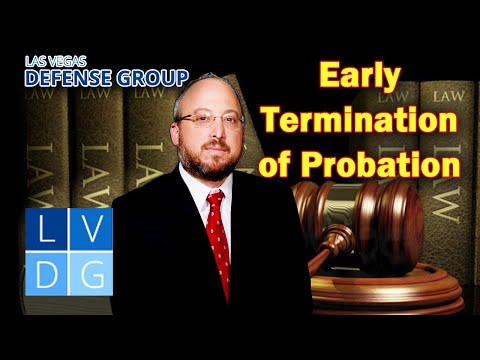
Judges in Nevada have the discretion to grant an early termination of probation if you’ve met certain conditions, such as (1) complying with all the terms of probation, (2) avoiding any new arrests, and (3) paying victim restitution if applicable.
There are many advantages to getting an early discharge from probation, such as:
- civil rights will be restored quicker (for felony defendants);
- there is no more risk of violating probation; and
- being able to return to normal life sooner
In this article, our Las Vegas criminal defense attorneys discuss how early termination of probation works in Nevada, including procedures and eligibility:
- 1. What is the legal definition of probation in Nevada?
- 2. What are common terms of probation?
- 3. How long does probation last?
- 4. How can probation be shortened in Nevada?
- 5. When do my civil rights get restored?

You may be eligible to finish probation early in Nevada if you exhibit good behavior.
1. What is the legal definition of probation in Nevada?
Probation is an alternative punishment to incarceration in some Nevada criminal cases. If you are on probation, you may be out of custody, but you still have to comply with various court orders as a condition of remaining out of custody.
If you are convicted of minor misdemeanors, you will usually get “informal probation“:
- You are not assigned a probation officer, though
- You have to complete various court orders such as staying out of trouble.
By contrast, If you are convicted of serious felonies, you may get “intensive supervision.” You usually have to submit to electronic monitoring and several other requirements that limit your movements and actions.
Although probation can be very inconvenient, it is preferable to incarceration because you get to remain out of custody. Note that sometimes judges will sentence you to a jail or prison term which will then be followed by a period of probation.
2. What are common terms of probation?
Judges determine which probationary terms to impose on a case-by-case basis. For instance, if you are convicted of drug possession (NRS 453.336), you will likely be ordered to submit to random drug testing as a term of your probation.
Fifteen common terms of probation in Nevada include:
- avoiding any further arrests by a law enforcement agency
- regular “check-ins” with the probation officer
- showing up to court so the judge can monitor progress
- paying fines and restitution
- staying away from certain locations
- not contacting certain people related to the criminal case
- not possessing any weapons
- attending counseling and/or rehab (especially in cases involving domestic violence)
- abstaining from controlled substances and/or alcohol
- remaining employed or in school
- completing community service
- wearing a location-tracking GPS device
- wearing a SCRAM alcohol-detection device
- submitting to drug tests (scheduled or unannounced)
- following curfew or remaining home on house arrest
If you allegedly violate your probation, you are entitled to a probation revocation hearing. Judges can remand you to jail for any probation violations. Judges can also give you a second chance to remain on probation if you have a good enough excuse.

If you are granted probation following a conviction of criminal charges, you will be required to complete various terms or face being remanded to jail.
3. How long does probation last?
When determining the length of a probationary period, the judge takes into account recommendations by the Nevada Department of Public Safety Division of Parole and Probation.
Minor cases may have probationary periods as short as a year or a few months. Probation may last for up to:
- 12 months for gross misdemeanors,
- 18 months for category E felonies,
- 24 months for category D or E felonies,
- 36 months for category B felonies, and
- 60 months for violent or sex offenses.1
4. How can probation be shortened in Nevada?
The Division of Parole and Probation must petition the court recommending early termination of probation when:
- You have not violated any conditions of probation during the past 12 months;
- You are current with any fee to defray the costs of the supervision;
- You have paid restitution in full or, because of economic hardship that is verified by the Division, have been unable to make restitution as ordered by the court;
- You have completed any court-ordered program (such as substance abuse, etc.); and
- You have not been convicted of a violent or sexual offense as defined in NRS 202.876 or a violation of NRS 200.508 or NRS 205.067.
If you do not meet these requirements, you may still ask for early termination of probation:
- First, your attorney files a motion for “early termination of probation” with the court.
- Then the judge contacts the D.A. and probation officer for their input; the judge may also hold a court hearing on the matter.
- Finally, the judge decides whether to grant or deny the request.
See our article on How long does early termination of probation take?
Note that some judges in Las Vegas never grant early termination of probation in any case. The remaining judges consider it on a case-by-case basis: These judges will be more likely to grant early termination of probation if the following two conditions are met:
- you have been compliant with all terms of probation, and
- you have paid all the restitution (if the court ordered any)
Judges may consider additional factors as well. Just some of them are:
- your number of prior criminal convictions
- the number of any other criminal prosecutions pending against you
- the number of years that elapsed since your most recent previous conviction
- the number of times in which you have been supervised as an adult or juvenile probationer
- the nature of the present offense and the number of persons victimized
Read more about factors for early termination of probation.
5. When do my civil rights get restored?
When you get discharged from probation, you immediately get your right to serve on a civil jury restored.
However, you need to wait four (4) more years to get back your right to hold office. Finally, your right to serve on a criminal jury is restored six (6) years after the discharge.
Note that if you apply for and are granted an unconditional pardon in Nevada, you get your civil rights restored immediately.2
Learn more about discharge from probation (NRS 176A.850).
Legal References
- AB 236 (2019); SB 412 (2023); NRS 176A.500. Authority of court to fix duration; limitations; arrest for alleged violation; powers and duties of peace officers; deduction of days.
1. The period of probation or suspension of sentence may be indeterminate or may be fixed by the court and may at any time be extended or terminated by the court, but the period, including any extensions thereof, must not be more than: (a) Three years for a: (1) Gross misdemeanor; or (2) Suspension of sentence pursuant to NRS 176A.260, 176A.290 or 453.3363; or (b) Five years for a felony.
See, for example: Creps v. State, (1978) 94 Nev. 351, 581 P.2d 842; Nev. Dep’t of Pub. Safety v. Coley (2016) 132 Nev. 149, 368 P.3d 758, 132 Nev. Adv. Rep. 13; Gravelle v. State (Nevada Court of Appeals, 2022) No. 83781-COA (unpublished). - Nevada Revised Statute 176A.850. Honorable discharge from probation: When granted; ineligibility; restoration of civil rights; effect; documentation.
1. A person who: (a) Has fulfilled the conditions of probation for the entire period thereof; (b) Is recommended for earlier discharge by the Division; or (c) Has demonstrated fitness for honorable discharge but because of economic hardship, verified by the Division, has been unable to make restitution as ordered by the court, may be granted an honorable discharge from probation by order of the court.
2. A person whose term of probation has expired and: (a) Whose whereabouts are unknown; (b) Who has failed to make restitution in full as ordered by the court, without a verified showing of economic hardship; or (c) Who has otherwise failed to qualify for an honorable discharge as provided in subsection 1, is not eligible for an honorable discharge and must be given a dishonorable discharge. A dishonorable discharge releases the person from any further obligation, except as otherwise provided in subsection 3.
3. Any amount of restitution remaining unpaid constitutes a civil liability arising upon the date of discharge and is enforceable pursuant to NRS 176.275.
4. Except as otherwise provided in subsection 5, a person who has been discharged from probation: (a) Is free from the terms and conditions of probation. (b) Is immediately restored to the right to serve as a juror in a civil action. (c) Except as otherwise provided in paragraph (d), is immediately restored to the right to vote. (d) Two years after the date of discharge from probation, is restored to the right to vote if the person has previously been convicted in this State: (1) Of a category B felony involving the use of force or violence. (2) Of an offense involving the use of force or violence that would constitute a category B felony if committed as of the date of discharge from probation. (e) Four years after the date of discharge from probation, is restored to the right to hold office. (f) Six years after the date of discharge from probation, is restored to the right to serve as a juror in a criminal action. (g) If the person meets the requirements of NRS 179.245, may apply to the court for the sealing of records relating to the conviction. (h) Must be informed of the provisions of this section and NRS 179.245 in the person’s probation papers. (i) Is exempt from the requirements of chapter 179C of NRS, but is not exempt from the requirements of chapter 179D of NRS. (j) Shall disclose the conviction to a gaming establishment and to the State and its agencies, departments, boards, commissions and political subdivisions, if required in an application for employment, license or other permit. As used in this paragraph, “establishment” has the meaning ascribed to it in NRS 463.0148. (k) Except as otherwise provided in paragraph (j), need not disclose the conviction to an employer or prospective employer.
5. Except as otherwise provided in this subsection, the civil rights set forth in subsection 4 are not restored to a person discharged from probation if the person has previously been convicted in this State: (a) Of a category A felony. (b) Of an offense that would constitute a category A felony if committed as of the date of discharge from probation. (c) Of a category B felony involving the use of force or violence that resulted in substantial bodily harm to the victim. (d) Of an offense involving the use of force or violence that resulted in substantial bodily harm to the victim and that would constitute a category B felony if committed as of the date of discharge from probation. (e) Two or more times of a felony, unless a felony for which the person has been convicted arose out of the same act, transaction or occurrence as another felony, in which case the convictions for those felonies shall be deemed to constitute a single conviction for the purposes of this paragraph. A person described in this subsection may petition a court of competent jurisdiction for an order granting the restoration of civil rights as set forth in subsection 4.
6. The prior conviction of a person who has been discharged from probation may be used for purposes of impeachment. In any subsequent prosecution of the person, the prior conviction may be pleaded and proved if otherwise admissible.
7. Except for a person subject to the limitations set forth in subsection 5, upon discharge from probation, the person so discharged must be given an official document which provides: (a) That the person has received an honorable discharge or dishonorable discharge, as applicable, from probation; (b) That the person is restored to his or her civil rights to vote and to serve as a juror in a civil action as of the applicable dates set forth in paragraphs (b), (c) and (d) of subsection 4; (c) The date on which the person’s civil right to hold office will be restored pursuant to paragraph (e) of subsection 4; and (d) The date on which the person’s civil right to serve as a juror in a criminal action will be restored pursuant to paragraph (f) of subsection 4.
8. Subject to the limitations set forth in subsection 5, a person who has been discharged from probation in this State or elsewhere and whose official documentation of discharge from probation is lost, damaged or destroyed may file a written request with a court of competent jurisdiction to restore the person’s civil rights pursuant to this section. Upon verification that the person has been discharged from probation and is eligible to be restored to the civil rights set forth in subsection 4, the court shall issue an order restoring the person to the civil rights set forth in subsection 4. A person must not be required to pay a fee to receive such an order.
9. A person who has been discharged from probation in this State or elsewhere may present: (a) Official documentation of discharge from probation, if it contains the provisions set forth in subsection 7; or (b) A court order restoring the person’s civil rights, as proof that the person has been restored to the civil rights set forth in subsection 4.
See, for example, Warden, Nev. State Prison v. Gaines, (1974) 90 Nev. 206, 522 P.2d 1009.

